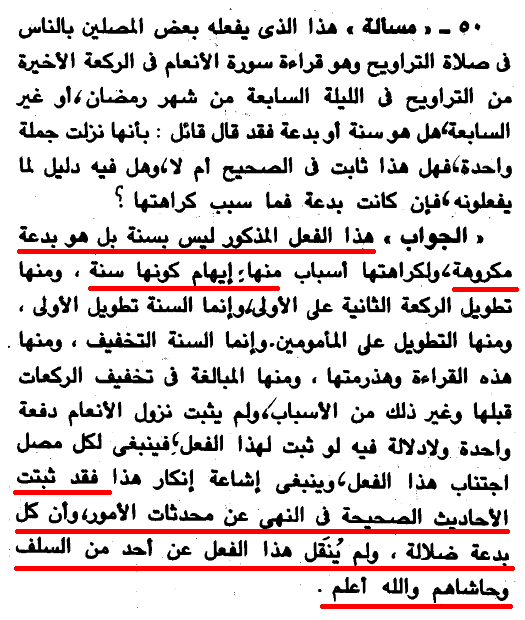 |
You are here:
Proof From the Prophet, Companions, the Salaf and the Scholars That the Bid'ah Idafiyyah (Despite Having a Basis in the Shariah) Is Rejected: Part 4 - Al-Nawawi Refuting a Bidah in the Tarawih Prayer
Posted by Abu.Iyaad, Editor in Foundations
Topics:
Bidah Haqiqiyyah
•
Bidah Idafiyyah
|
 |
Quotes from Shafi'i Jurists
We have some valuable quotes in some of the more lengthy articles dealing with the academic fraud of todays innovators in trying to twist the statements of al-Shafi'i and some of the later Shafi'ite jurists such as al-Nawawi and al-Izz bin Abd al-Salam to justify innovations in worship in a broad sense. Because these are important quotes and are buried in long articles, we are going to isolate them and give them their own separate article for easy reference and linking purposes. At the same time it should be pointed out that whilst there is agreement between the general tone and spirit in the rejection by these scholars of innovations in worship and between what the Salaf were upon of the same, because of their particular orientation in understanding this matter, some of these jurists may have allowed certain affairs which the Salaf never allowed and which the Salaf would have treated as blameworthy innovations.
Imam al-Nawawi's Refutation of A Bid'ah In The Tarawih prayer
View this quote in the original article here:
This fatwa can also be found in the printed version of his fatawa in "Fatawa al-Imaam al-Nawawi" organized and arranged by his student Alaa al-Din Ibn al-Attaar, published 1411H in Egypt (on pages 25-26).

 Issue: What is done by some of those who (lead) the people (in prayer) in Salat al-Tarawih, which is the recitation of Surah al-An'aam (a lengthy Surah in earlier part of the Qur'an) in the last rakah of al-Tarawih on the seventh night in the month of Ramadan, or on other than the seventh month, is it sunnah or bidah? For someone could say that [the surah] was revealed in a single night (and thus praying with it in a single go is acceptable), so is it established in the Sahih or not? And there is any evidence therein for what they do, and if it is a bidah, what is the reason for its abhorrence? Issue: What is done by some of those who (lead) the people (in prayer) in Salat al-Tarawih, which is the recitation of Surah al-An'aam (a lengthy Surah in earlier part of the Qur'an) in the last rakah of al-Tarawih on the seventh night in the month of Ramadan, or on other than the seventh month, is it sunnah or bidah? For someone could say that [the surah] was revealed in a single night (and thus praying with it in a single go is acceptable), so is it established in the Sahih or not? And there is any evidence therein for what they do, and if it is a bidah, what is the reason for its abhorrence?
Answer: This aforementioned action is not a sunnah, rather it is a detested bidah (innovation), and its abhorrence has numerous reasons. From them: giving the impression that it is a sunnah, and form them: lengthening the second rakah over the first. The sunnah is to make it lighter (shorter), and from them: the babbling in the recitation (which is done hastily), and from them: the exaggeration in shortening the rakahs which come before it and other such reasons. It is not established that [surah] al-An'am was revealed in a single go and there is no evidence for that, and even if it was established it would not have constituted evidence for this practice. Hence, it is desirable for every one who prays (leading the people) to shun this practice, and it is desirable to spread rejection of it, for authentic hadeeths are established regarding the rejection of newly-invented matters, and that every innovation is misguidance, and this practice has not been narrated from any one of the Salaf, and far from it that it should, and Allaah knows best.
Link to this article: Show:
HTML Link •
Full Link •
Short Link
Share or Bookmark this page: You will need to have an account with the selected service in order to post links or bookmark this page.







|
|
|
Related Articles:
- Proof From the Prophet, Companions, the Salaf and the Scholars That the Bid'ah Idafiyyah (Despite Having a Basis in the Shariah) Is Rejected: Part 5 - Al-Nawawi Refuting Bidah Related to Prostration
- Proof From the Prophet, Companions, the Salaf and the Scholars That the Bid'ah Idafiyyah (Despite Having a Basis in the Shariah) Is Rejected: Part 4 - Al-Nawawi Refuting a Bidah in the Tarawih Prayer
- Proof From the Prophet, Companions, the Salaf and the Scholars That the Bid'ah Idafiyyah (Despite Having a Basis in the Shariah) Is Rejected: Part 3 - Al-Nawawi's Refutation of the Bidah of Salat Al-Ragha'ib
- Proof From the Prophet, Companions, the Salaf and the Scholars That the Bid'ah Idafiyyah (Despite Having a Basis in the Shariah) Is Rejected: Part 2 - Al-Nawawi's Refutation of the Bidah of Salat Nisf Sha'ban
- Imaam al-Shatibee Explaining Bidah Haqiqiyyah and Bidah Idafiyyah
- Proof From the Prophet, Companions, the Salaf and the Scholars That the Bid'ah Idafiyyah (Despite Having a Basis in the Shariah) Is Rejected: Part 1 - the First Attempts to Innovate in the Time of the Prophet
- Innovation Is of Two Types, Haqeeqiyyah (Essential, Proper) and Idaafiyyah (Relative)
Add a Comment
You must be registered and logged in to comment.
|
 |




|
 |



